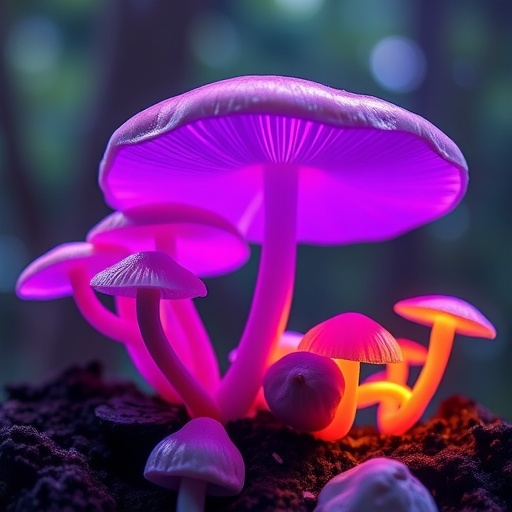Groundbreaking findings from a recent clinical trial have illuminated the profound and durable therapeutic effects of psilocybin, a naturally occurring psychedelic compound found in certain species of mushrooms, on depression and anxiety symptoms in patients with cancer. This study addresses a significant and often overlooked dimension of cancer care: the psychological distress and major depressive disorder (MDD) that burden many individuals battling this disease. Published online by the prestigious journal CANCER, a peer-reviewed outlet of the American Cancer Society, these results signal a potential paradigm shift in how psychiatric symptoms accompanying oncological illnesses might be managed.
Depression and anxiety are among the most debilitating comorbidities in cancer patients, adversely affecting quality of life and clinical outcomes. Traditional pharmacologic treatments often carry limitations, including delayed onset of action, partial efficacy, and undesired side effects. This novel research explores the effects of psilocybin administered as a single 25-milligram dose in conjunction with structured psychological support tailored to this vulnerable patient population. The trial was conducted as a phase 2, open-label study involving 28 cancer patients diagnosed with major depressive disorder, offering a meticulously monitored therapeutic context.
Participants received preparatory psychological counseling prior to psilocybin administration, followed by guided support during the psychedelic experience and integration therapy afterward. This multidimensional approach is crucial given psilocybin’s potent psychoactive effects, which include altered perception, emotional release, and insights into one’s mental state. The strategy ensured safety, maximized therapeutic benefits, and facilitated the consolidation of positive cognitive and emotional shifts initiated during the acute drug phase.
Notably, long-term follow-ups conducted two years post-treatment revealed that over half of the patients (approximately 53.6%) exhibited a significant reduction in depressive symptoms. Furthermore, 50% experienced sustained remission from depression, indicating the profound durability of psilocybin’s antidepressant effects. Anxiety symptoms also diminished substantially, with 42.9% of participants reporting long-lasting relief. These results underscore that psilocybin, even as a single intervention complemented by psychological care, can produce enduring symptom amelioration in cancer survivors grappling with major mood disorders.
Mechanistically, psilocybin acts primarily as a selective serotonin 2A receptor (5-HT2A) agonist, modulating neural circuits implicated in mood regulation, emotional processing, and cognitive flexibility. Functional neuroimaging studies have documented psilocybin’s ability to disrupt default mode network activity, which is often hyperactive or dysregulated in depression. This disruption promotes neural plasticity and fosters novel patterns of thought and emotional processing, thus facilitating psychological breakthroughs in distressed individuals.
In this study cohort, the psychological support framework leveraged these neurobiological underpinnings by preparing patients to harness and integrate the insights and existential shifts that emerged during the psychedelic session. This synergy between pharmacology and psychotherapy appears vital in converting the acute psychedelic experience into meaningful, lasting clinical improvements.
Building upon these promising findings, an ongoing randomized, double-blind clinical trial is actively evaluating the efficacy of repeated dosing, with patients receiving up to two 25-mg psilocybin doses versus placebo. This study aims to replicate and extend the initial trial’s outcomes, test dose-response relationships, and determine whether multiple administrations can elevate remission rates further, potentially benefiting a larger majority of cancer patients suffering from depression and anxiety.
Dr. Manish Agrawal, MD, lead author of the study and affiliated with Sunstone Therapies, emphasized the clinical significance of these developments. He noted that a single psilocybin dose, administered under professional supervision with robust psychological support, yielded positive mental health outcomes persisting for as long as two years. Moreover, ongoing investigations seek to ascertain whether repeated treatments can enhance these benefits and become integrated into standard oncologic care for psychiatric comorbidities.
The implications of this line of research extend far beyond oncology. Psilocybin and related psychedelic agents are emerging as potent tools in psychopharmacology, challenging the conventions of symptom management across various psychiatric disorders. The unique capacity of psilocybin to induce lasting personality and mood changes through transient neurochemical modulation distinguishes it from conventional antidepressants and anxiolytics that require chronic administration.
Beyond clinical outcomes, these findings prompt a reevaluation of the biopsychosocial model of cancer treatment, advocating for interventions that address not only the physical but also the psychological and existential suffering of patients. Incorporating psychedelics within such treatment frameworks demands rigorous scientific validation and careful ethical consideration – challenges this research model addresses through robust clinical trial methodologies.
The journal CANCER’s role as a leading interdisciplinary platform for oncologic science provides an ideal venue for disseminating these findings, bridging the gap between psychiatric research and oncology practice. The study’s publication signals growing acceptance of psychedelic-assisted therapies within mainstream medical research, fostering dialogue about the necessity to innovate cancer care modalities holistically.
Wiley, the publisher of CANCER and a global leader in scientific communications, supports the wide dissemination of this transformative research. The company’s mission to empower knowledge seekers aligns with amplifying novel treatments that may improve mental health outcomes and enhance survivorship for cancer patients worldwide.
In summary, this rigorous investigation into single-dose psilocybin therapy demonstrates the compound’s potential to elicit lasting remissions of depression and anxiety in patients confronting the dual burden of cancer and psychiatric illness. The multidisciplinary integration of neuropharmacology, clinical psychology, and oncology heralds a new frontier in cancer care, where mental health is accorded equal priority and novel treatments are explored systematically. As research progresses, psilocybin may emerge as a cornerstone of compassionate, comprehensive cancer treatment, improving the lives of thousands of patients globally.
—
Subject of Research: Long-term efficacy of single-dose psilocybin in treating depression and anxiety among cancer patients with major depressive disorder.
Article Title: Long-term Benefits of Single-Dose Psilocybin in Depressed Cancer Patients
News Publication Date: 16 June 2025
Web References:
- CANCER Journal: https://acsjournals.onlinelibrary.wiley.com/journal/10970142
- DOI link: http://dx.doi.org/10.1002/cncr.35889
References:
Agrawal M., Roddy K., Jenkins B., Leeks C., Emanuel E. (2025). Long-term Benefits of Single-Dose Psilocybin in Depressed Cancer Patients. CANCER. DOI:10.1002/cncr.35889
Keywords: Cancer, Depression, Psychiatric disorders, Mental health, Anxiety, Mushrooms, Clinical trials, Psilocybin, Psychedelic therapy, Serotonin 2A receptor, Neuroplasticity, Oncology




